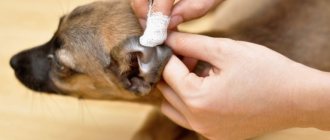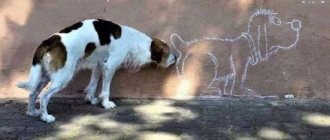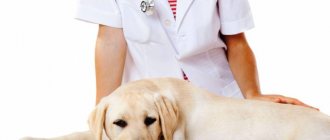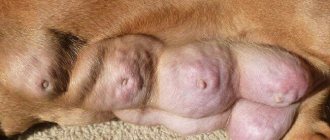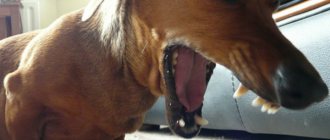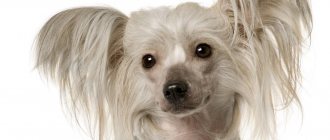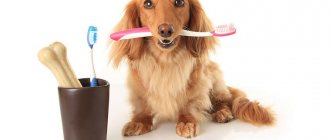Common non-pathological causes
There are actually many reasons why a dog smells like fish and, unfortunately, not all of them are harmless. However, you should not sound the alarm ahead of time; it is better to first become familiar with the main provoking factors of a non-pathological nature.
A caring owner notices deviations in the pet’s well-being in a timely manner
The main ones include:
- Stressful situations, against the background of which in almost 100% of cases the pet begins to exude a rather rich and unpleasant aroma. As a rule, this is observed if, against a background of stress, the animal experiences pain for a long time.
- Few people might think, but fear can also cause the appearance of a fetid, rotten odor. This is a kind of protective reaction of the body to potential danger. In apartments, the most common sources of fear are electrical appliances, such as vacuum cleaners, washing machines and other noisy household appliances.
Note! Stress and fear will never have a positive effect on your pet's body. It is better to start cleaning the house - provided that the animal is afraid - when the pet is on a walk.
A dog that is frightened by a loud vacuum cleaner may smell unpleasant.
The dog is lying in rotten meat
Many breeds of dogs, especially those with hunting blood, lie in carrion and rotten meat. Owners suffer from this habit, but it is almost impossible to correct the pet’s behavior. On every walk, the dog looks for fragrant garbage and immediately rolls out in it.
If you are the owner of an active, hunting dog that periodically smells of fish, we advise you to carefully monitor your pet during walks. Most likely, the pet finds dry fish peelings or the remains of other spoiled food, the smell of which is very intense.
Important! The dog falls out in the stench instinctively and does not see anything wrong with it, but such events are extremely dangerous for animals. Carrion and rotting food remains are a breeding ground for bacteria and parasites!
External factors influencing unpleasant odor from the mouth
Why does my dog's breath smell like rotten meat?
The most common external triggers for the formation of an unpleasant odor are:
- The daily diet contains a high concentration of protein. When such foods are digested, a large amount of nitrogen is released, hence the putrid odor.
- Deposition of food remains behind the jowls of brachycephalic animals. People with short muzzles often do not have time to swallow all the food while eating; its remains accumulate in the cheek space, where they rot and emit an unpleasant odor.
- The animal is given only chlorinated water to drink. It is important to understand that the cause of the development of dysbiosis can be a refusal to use bottled or spring water. And dysbacteriosis is already a significant reason for the appearance of an unpleasant odor.
Additionally, it is worth noting an unbalanced diet that is not suitable for the pet. If difficulties arise in developing a diet, it is better to seek help from a veterinarian or breeder.
NO low quality chlorinated water
*Prices do not include medications
Bloody discharge in a dog
Animal vaccination
Veterinarian help at home
Operations on animals
Therapy for cats and dogs
Surgery for dogs and cats
Euthanasia of animals
Cremation of cats and dogs
White discharge from eyes in dogs
Histology
Skin examination for dermatitis
Blood test for cat, dog
Blood test for babesiosis (cytoplasmosis)
Urine and stool tests
Cytology
Animal tests
Animal blood tests
Skin examination for dermatitis
Blood test for cat, dog
Blood test for cytoplasmosis
Biochemistry of urine
Blood cytology
Blood biochemistry
Stool examination
Diagnostics for animals
Ultrasound of a cat
Ultrasound of a dog
Digital diagnostics of animal diseases
X-ray of animals
Electrocardiography (ECG)
Diagnosis of infectious diseases
Hotel for animals
Temporary care of animals
Day hospital for animals
Intensive therapy
Infectious diseases hospital
24-hour hospital
Hotel for cats
Hotel for dogs
Surgery for animals
Reduction of dislocations in dogs and cats
Sterilization
Castration
C-section
Treatment of fractures and dislocations
Surgical treatment of joints
Urolithiasis disease
Abdominal surgery on animals
Veterinarians
Dermatologist
Oncologist
Ultrasound diagnostic specialist
Dentist
Surgeon
Therapist
Veterinary care at home
Animal therapy at home
Animal surgeries at home
Assistance in childbirth for animals
Emergency vet visit
Groomer at home
Vaccination at home
Phone: +7
Causes of pungent odor and possible diseases
There are really many reasons why a pet begins to emit an unpleasant odor. To identify the exact provoking factor, it is necessary to undergo a medical examination. The veterinarian will write out all the necessary directions.
Diseases of the genitourinary system
How to get rid of dog smell in an apartment
In a dog, the smell from under the tail may indicate developmental pathologies or diseases, inflammatory conditions of the genitourinary system. Most often, the smell is not fishy, but ammonia. In most cases, dogs are diagnosed with kidney failure. The pathology is accompanied by a slowdown in the elimination of waste products from the body, which poisons the tissues.
Among owners of Yorkshire terriers and other decorative breeds, a very common question is why a Yorkie's urine smells. The fact is that at the genetic level they have pathologies in the development or diseases of the genitourinary system.
Important! The pet must eat well and undergo regular medical examinations at a veterinary clinic.
Oral problems
As a rule, we are talking about tartar. The manifestation of such a symptom does not pose a threat to the health and life of the pet, but plaque on the teeth may not be so harmless. The destruction of tooth enamel, the formation of foci of infection, pain and difficult treatment can negatively affect the pet’s quality of life.
Tartar in dogs
Worms
If your dog's tail stinks, this may indicate that the body is infected with worms. In fact, this is a common problem, especially if you do not regularly take a preventative course of taking anthelmintic drugs.
Liver diseases
If your dog smells like rotten meat, the cause may be serious problems with the liver. As a rule, a pronounced unpleasant odor begins to bother you already at the stages of tissue necrosis, when, unfortunately, it is no longer possible to help.
Autoimmune imbalance
If an unpleasant odor appears from your pet, you should think about the development of autoimmune diseases. Unfortunately, most often we are talking about an incurable disease – diabetes. If your pet begins to itch or, on the contrary, suddenly gain weight and is thirsty, then you should immediately take a blood sugar test.
Oncological diseases
The dog also smells like fish from under its tail and, possibly, from its mouth as a result of the development of a malignant neoplasm in the animal’s body. A tendency to develop cancer has been noted in boxers and other purebred dogs with a short, raw muzzle. Neoplasms can also form in the oral cavity, which is not uncommon.
If your dog has diarrhea without other symptoms
If the dog simply has diarrhea without complications, then the reasons most likely lie on the surface. Usually the dog defecates 2 to 4 times a day, its feces are formed, moderately soft and moist. When an animal visits the toilet more often and the stool loses its shape, becoming thin and watery, a problem appears - diarrhea.
Possible reasons
- Stale or low-quality food;
- Unsuitable food for dogs;
- Switching from one type of food to another (for example, from homemade food to special dry food);
- A sudden change in brand of dog food;
- Allergy to any food ingredient;
- Accidentally eaten foreign object;
- Disturbances in the gastrointestinal tract due to medications taken;
- Infection with helminths.
Treatment
Before you begin treating an animal, you need to analyze the food it received the day before. If a suspicious eaten product is detected: raw meat, sour milk, new food, etc. low-quality or unsuitable products, simply exclude them from the dog’s diet. If you overeat something, try to reduce the portion or increase the interval between meals.
If, apart from diarrhea, the dog is not bothered by anything, but the stool remains liquid after the measures taken, it is necessary to do home treatment.
What to do?
- Do not let the dog eat for 24 hours;
Give her clean water as often as possible to replenish the lack of fluid and electrolytes in the body; - If necessary, administer intravenous infusion solutions;
- Give the animal adsorbents that collect toxic poisons, which will then be released through the intestines;
- For prolonged diarrhea, use antibiotics;
- If worm eggs are detected in stool tests, take anthelmintic drugs.
Poor nutrition
How to get rid of dog smell from a dog
If your puppy or adult pet smells rotten or fishy on a consistent basis, this may indicate that the food is not right for him. This issue is especially acute among dog owners who eat ready-made dry industrial food of dubious quality.
Low-quality dry dog food is the cause of digestive disorders
Dogs cannot handle all foods that the human stomach can easily handle. For example, the owner decided to pamper his pet with a delicious bun that activates the sebaceous glands. The result is that the animal’s body produces a large amount of sebum, which causes the stench.
For your information! A specific smell may come from your pet if fish is often present in its diet. Of course, seafood is healthy, but it is important to adhere to moderation in everything.
Experts strongly recommend excluding homemade food from the dog’s diet, which activates the processes of decay of food residues in the intestines. We are talking about peas, beans, cabbage, pasta and potatoes. They often provoke the development of diseases of the digestive system.
The dog has diarrhea and vomiting
With the causes and treatment of uncomplicated diarrhea, everything is extremely simple. The situation is more complicated when the dog begins to experience vomiting in addition to diarrhea. In this case, the pet may lose some of the liquid, digested or not completely digested food, sometimes with the addition of mucus from the pharynx or stomach. Most often, if you vomit once, there is no need to worry too much. But if your dog vomits several times, is depressed and refuses food, or has a fever, rush to the doctor. Diarrhea and vomiting in a dog can sometimes be a symptom of a dangerous illness or severe food poisoning. Profuse foamy vomiting, sometimes with particles of blood or mucus, may indicate the presence in the body of a foreign body stuck in the intestines. So, what should you do if your dog has diarrhea and vomiting?
Preventing bad breath in dogs
It is known that it is always easier to prevent a problem from developing than to solve it later. So it is here. Experts have developed a small set of simple measures, the systematic implementation of which will reduce the likelihood of the formation of an unpleasant odor:
- At least once a year it is required to visit a veterinary clinic, including a veterinary dentist.
- It is recommended that dogs brush their teeth, although many still consider this procedure inappropriate. The optimal frequency of the procedure is once with an interval of 4-5 days. You can use special toothbrushes or a piece of bandage.
- To cleanse tooth enamel, you can use special bones that contain grains, vegetables and rawhide.
- If the condition of the oral cavity is neglected, then it is recommended to carry out ultrasonic teeth cleaning.
How to clean dogs' teeth with a bandage
The pet’s diet also plays a big role in this matter. Experts allow two options: feed the animal with high-quality industrial dry formulas of premium and super-premium quality, or a varied and natural diet.
Prevention measures
Bad breath in your dog can be avoided by:
- monitor the quality of food consumed by the dog;
- brush the animal's teeth;
- rinse your pet’s mouth with chamomile infusion or mouthwash;
- do not allow your pet to play with branches and excessively hard objects that can injure the gums;
- Visit your veterinarian periodically and follow all his recommendations.
If your dog resists frequent brushing, you can purchase special toys to remove plaque and massage the gums. Natural tomato juice is used to prevent caries and tartar formation. They need to water their pet 2-3 times a week. The juice can be replaced with chopped tomatoes and added to porridge or any other food.
The appearance of an odor is a signal that unpleasant changes are occurring in the animal’s body, which should be combated by all available means.
What to wash so it doesn't stink
To get rid of the unpleasant odor, first of all, it is recommended to try Nizoral medicinal shampoo, diluted with water in a 1:1 ratio (sold in a pharmacy for people). The pet's body must be moistened with water, the fur and skin thoroughly washed, and left for 10 minutes. The optimal frequency of the procedure is with an interval of 5-6 days.
Shampoo Nizoral
If bald spots form on the body, then you should not postpone a visit to the veterinarian. He will scrape off the sources of the lesion, after which he will develop a therapeutic course.
How to get rid of smell in an apartment
Proven and effective ways to get rid of the unpleasant smell of a pet in an apartment:
- Wash the animal's bedding regularly, without waiting for the appearance of an unpleasant, albeit faint, odor. It is recommended to use laundry soap or hypoallergenic washing powder during the washing process.
- Pet leprosy should be treated with special formulations that effectively eliminate unpleasant odors, for example, lemon juice, iodine, rubbing alcohol, soda.
A healthy dog shouldn't stink, so it's important to have regular checkups.
Healthy and nice smelling dog
If your dog smells unpleasant, don’t panic; just observe your pet’s condition and show it to the veterinarian.
Urine smells strong
To find out why a dog's urine smells bad, you need to remember its biological functions. This is a liquid that removes salts, poison, drug metabolites, and decay products from the body.
- Violation of water-salt balance. It can be triggered not only by a large amount of seasonings and salt in the diet, but also by a lack of fluid. Urine becomes dark in color and has a pungent musty odor. In this case, you need to give your pet more water or other liquid, eliminate salt and seasonings from the diet. If your pet's condition worsens, you should consult a doctor for a more detailed diagnosis.
- Medicines . Pharmacological agents often disrupt metabolism, and their excipients are not absorbed by the body and are excreted unchanged in the urine. Most medications or nutritional supplements intended for dogs are easily excreted and only change the color of urine without affecting the smell. If you associate taking medications with the appearance of a bad odor, you need to stop taking them.
- Hormonal disbalance . The endocrine system also affects the quantity, quality (density, amount of eliminated toxins) and parameters of urine. The cause of the failure may be seasonal changes, mating games, or illness. In pregnant and lactating dogs, changes in smell and color are normal. If there are no obvious reasons for the change in odor, contact a veterinary clinic to confirm or refute the hormonal imbalance.
- Protein . Increased concentration of protein in the urine. This happens with various viral diseases and an excess of meat products in the diet. Along with the odor, small gray or white lumps appear in the urine. In this case, it is necessary to reduce the proportion of animal products in the diet.
- Kidney dysfunction . The kidneys regulate fluid exchange and the removal of foreign substances from the body. If the kidneys malfunction, they cannot cope with the task, swelling appears, or, on the contrary, the dog has a frequent urge to urinate and rapid loss of fluid.
